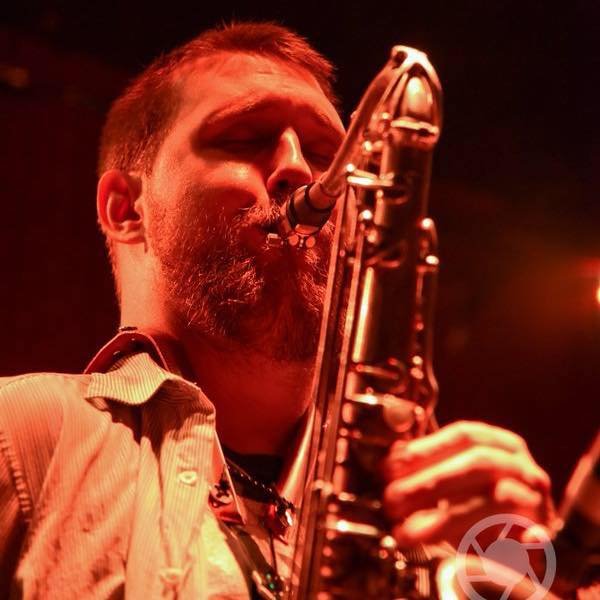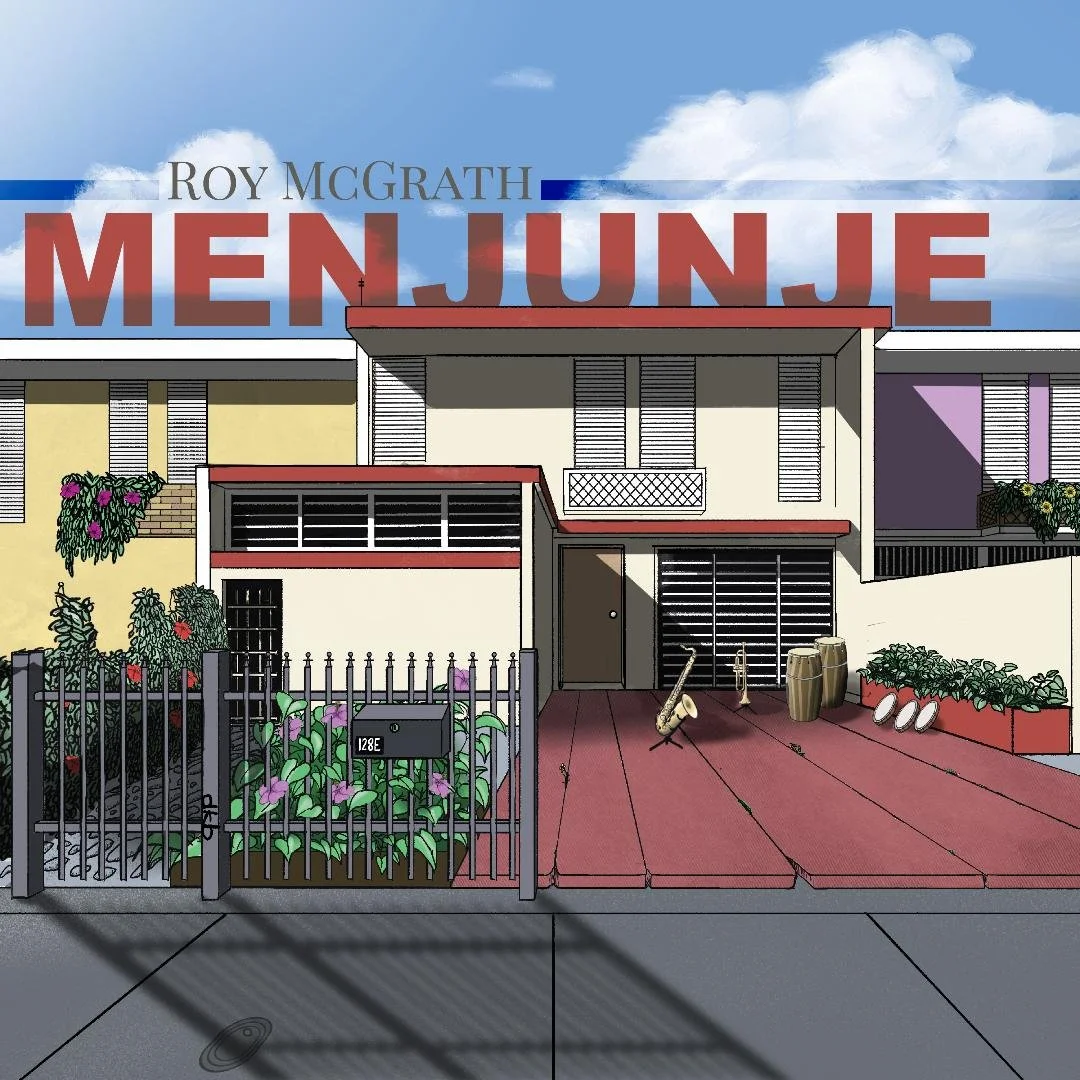Roy McGrath Reinterprets Classics from Puerto Rico and Unveils New Tunes From Now on Menjunje
Imagine this: You, a young musician, have been hired to play four classic compositions made famous by your countryman. This icon, a septuagenarian, will be present, even though his health is declining.
You ready?
Well, this scenario actually happened to tenor saxophonist Roy McGrath. Born and blossomed in Puerto Rico, McGrath guided his ensemble through tunes by Antonio Caban Vale that the island’s inhabitants had eagerly embraced. This singer/songwriter, better known as El Topo, is forever esteemed for “Verde Luz,” Puerto Rico’s unofficial, or second, national anthem. This artist and the song’s 50th anniversary were celebrated on August 6, 2017, by McGrath and 300 attendees at the Segundo Ruiz Belvis Cultural Center, located on West Armitage. While El Topo’s endurance did not allow him to stay long, McGrath recalled, his presence and warm vibes were still felt.
Nearly six years later, McGrath has released Menjunje. This self-produced project combines the El Topo standards performed at the Center with three McGrath originals and one standard from the Great Puerto Rican Songbook.
“I reorchestrated and rearranged El Topo’s songs, adding my own personality to them,” McGrath said. “El Topo’s music is very simple but very authentic. It’s very good music to take apart and do your own thing with.”
McGrath’s ensemble for Menjunje – which means concoction in English – features the classic quintet, with trumpeter Constantine Alexander and bassist Kitt Lyles, and three percussionists. “For me, the percussion is the highlight of the album,” said McGrath, when discussing the musicality and dexterity displayed by Victor Junito Gonzalez, Javier Quintana-Ocasio, and Jose A. Carrasquillo. “We worked hard on all the percussion breaks and making sure that we were playing together.”
In February 2022, two months before recording the album, McGrath spent two weeks in Puerto Rico, rehearsing with drummer Efrain Martinez and pianist Eduardo Zayaz. “I also went out every single day and night to research and meet people that played bomba and plena,” McGrath said, referencing the regional music the ensemble explored. “Just because you were born and raised in Puerto Rico doesn’t mean you’re deep into the folklore of the music. The people that play bomba and plena on the island see themselves as ambassadors of the music.”
Zayaz and McGrath first practiced together some 20 years ago at the Conservatorio de Musica de Puerto Rico, right next door to the latter’s childhood home. And when Martinez, also an accomplished author, expressed interest in recording with McGrath, the album’s concept and spirit were born. “Efrain wrote a book called Raiz. It’s about how to play bomba and plena on the drum set,” McGrath said. “He might be the number-one source on how to do it, and he’s one of the baddest cats on the drum set in Puerto Rico.”
Menjunje begins with El Topo’s “Guamani.” This song’s rhythms, McGrath explained, originate from the island’s mountains before segueing into a Cuban groove. Most songs on the album, he added, begin in one style and then embrace another.
“Some fluctuate between bomba and plena. This is very difficult, because you have to go from the handheld drum, such as the Punteador and the Requinto, to the Barril, or barrel drum. We call them ‘bomba barrels,’” McGrath explained, adding that the Barril is made from different barrels. “ ‘Linda Morena,’ (cut seven) is a song where you have to pick up and put down the drums all the time. It’s a most difficult song for the percussionists.”
McGrath’s emotions then turned poignant when discussing “Antonia,” El Topo’s farewell love poem to a martyr. On March 4, 1970, protests by University of Puerto Rico students objecting to military presence directly across from their campus became violent between them and law enforcement.
“Some police officer fired shots in the air, and Antonia Martinez-Lagarez, a 20-year-old student watching the protests from a second-floor balcony…was killed,” he explained. “Was the cop shooting randomly in the air and hit her? Nobody identified the cop because it was the middle of a heated battle. They never found the cop. He could still be alive right now.”
McGrath then translated the song’s Spanish lyrics: “ ‘Antonia, your name is a history of a community that has looked for itself and found itself in you. Your name is like the bird’s wings, as they see the light of the morning’s sun.’
“And these,” he continued, “are the lyrics that really give me the chills: ‘Those that one day shed the petals of your blood did not know that, by shedding those petals, they planted the seed in the air that made the town rise up against them.’ ”
These protests, he added, happened 10 minutes away from where he grew up. He also took classes at the location where the military had once been housed.
“I saw Antonia’s picture online, and she was just a beautiful 20-year-old who had her whole life ahead of her,” McGrath continued. “She is a symbol of the victimization of students and military oppression on the island.”
Beyond arranging one other El Topo classic, “Loquito Por Ti,” McGrath composed “For Zee,” “Groove #4,” and “Bolerito.” The first song is for a woman who used to be his, but, apparently, no longer required his services. “Groove #4” came from a self-issued challenge to write 10 grooves that hit hard. This one, he said, worked best in an Afro-Caribbean context: “It’s really just a simple bass groove, and I expanded it into a song by adding different sections and horns.”
“Bolerito” comes from a Puerto Rican/Cuban music genre called bolero, which is a ballad seasoned with Caribbean spices. Whenever the suffix -ito is added to a Spanish word, McGrath explained, it means a smaller version.
“ ‘Bolerito’ is my failed attempt to write a bolero, because it’s in seven, and boleros are in four,” he said, referencing the song’s time signature. “It’s a little off-kilter when you play it in seven, but I still love this song.”
Preparing and presenting Menjunje, McGrath continued, consumed him, for you, the listener, body and soul.
“This took every inch of my brain, wallet, and psychology,” he said. “I just want people to listen to it. That’s all I want. This was not easy, but man was it worth it!”


